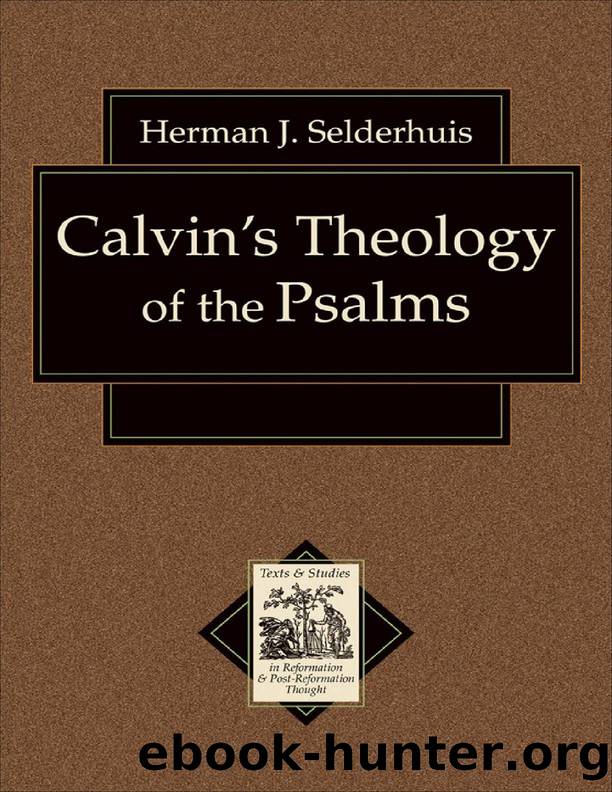Calvin's Theology of the Psalms by Herman Selderhuis

Author:Herman Selderhuis
Language: eng
Format: epub
Publisher: Baker Academic
Published: 2007-08-15T00:00:00+00:00
According to Calvin there is no better rule of life (vivendi regula) than âto be content with the lot which God has given, not trying to fashion oneâs own happiness but only considering what he [God] calls us to, neither longing for or aspiring to prestige but remaining content with oneâs situation.â[33] He who prefers another rule of life, Calvin notes, will end in a labyrinth.[34] This rule has been followed by generations of Calvinists and according to the nature of monastic rules, it could be said that the âCalvinistic orderâ has faithfully kept this regula Calvini.
Meanwhile, the Protestant Reformer denounces the opinion that success belongs to those who have managed their worldly interests well, often to the detriment of the simple.[35] This does not mean that Calvin scorns an industrious life. On the contrary, the word of God nowhere censures hard work or planning, and faithfulness towards oneâs duty is a praiseworthy virtue. Thus, it is not the will of God that we should sit idly with folded arms but that we should instead use our talents. Calvin grounds this ethos of diligence in creation. Indeed, the pains of labor stem mainly from the curse of sin, but even if we had remained in the original sinless state, we would have labored just as Adamâs charge proves.[36]
Yet, in spite of all our exertions to this end, we still depend upon Godâs blessing. This does not mean that he who works hard is blessed; it means instead that even hard work is fruitless without Godâs blessing. The promise of Godâs blessing can stimulate us to diligence, but this blessing is no mere reward.[37] Challenging a well-known hypothesis, Calvinâs commentary on the Psalms disproves the idea that he was the father of capitalism.[38]
Calvin clearly denounces the secular attitude common to his era and ours which aspires after âthe good life (beatam vitam) in idleness, pleasure, and wealth.â[39] This rejection should not surprising to us since, just as Calvin believes that God cannot be idle, the same applies to mankind which bears Godâs image. Diligence should never seek as a final end merely to enjoy of the fruits of oneâs labors; for Calvin, the purpose of industry is service.
Consequently Calvin favors a positive attitude towards the Sabbath. The Sabbath, of course, belongs to the shadows of the law, yet it is an image of new spiritual life which rests from our works while God works in us.[40] This separate day, therefore, was not given to be inactive, but to praise God and to think about his works. Daily toil prohibits us from giving due attention to this during the other days of the week. Calvin represents this as an anthropological problem: because our minds are so inconstant we are easily distracted from many things, including God.[41] Hence we must have one day free to direct ourselves wholly to him.
Download
This site does not store any files on its server. We only index and link to content provided by other sites. Please contact the content providers to delete copyright contents if any and email us, we'll remove relevant links or contents immediately.
| Anglican | Baptist |
| Book of Common Prayer | Calvinist |
| Episcopalian | Inspirational |
| Lutheran | Methodist |
| Pentecostal & Charismatic | Presbyterian |
| Quaker | Seventh-Day Adventist |
| Shaker | Theology |
Angels by Billy Graham(1926)
How To Be Born Again by Billy Graham(1781)
Peace with God by Billy Graham(1689)
Unbroken Curses by Rebecca Brown & Daniel Yoder(1575)
God's Prophetic Symbolism in Everyday Life by Adam Thompson & Adrian Beale(1497)
The School of Biblical Evangelism by Ray Comfort(1438)
Call by Rick Joyner(1430)
Martin Luther: The Man Who Rediscovered God and Changed the World by Eric Metaxas(1399)
Power over the Enemy by John Osteen & Joel Osteen(1354)
Jonathan Edwards: A Life by Marsden George M(1236)
Fresh Wind, Fresh Fire by Jim Cymbala(1234)
Prayers That Bring Healing and Activate Blessings: Experience the Protection, Power, and Favor of God by John Eckhardt(1222)
Liturgy of the Ordinary by Tish Harrison Warren(1220)
The Supernatural Power of a Transformed Mind Expanded Edition: Access to a Life of Miracles by Bill Johnson(1207)
Unmasking the Devil: Strategies to Defeat Eternity's Greatest Enemy by John Ramirez(1206)
An Altar in the World by Barbara Brown Taylor(1195)
Reformation Theology by Littlejohn Bradford(1187)
Seeing the Voice of God: What God Is Telling You through Dreams and Visions by Smith Laura Harris(1142)
Martin Luther by Mansch Larry D.; Peters Curtis H.;(1131)
